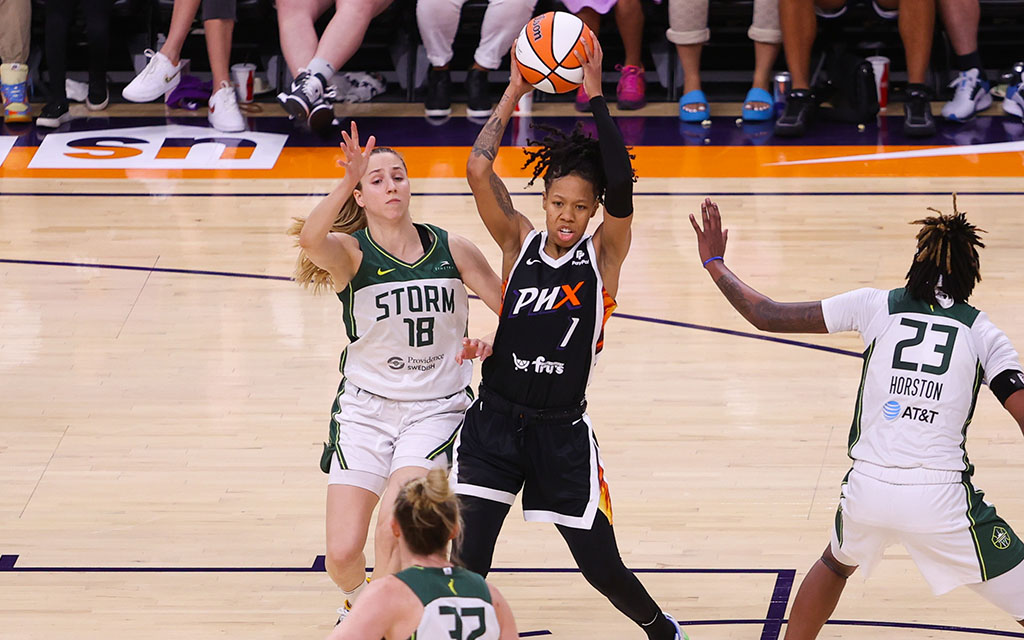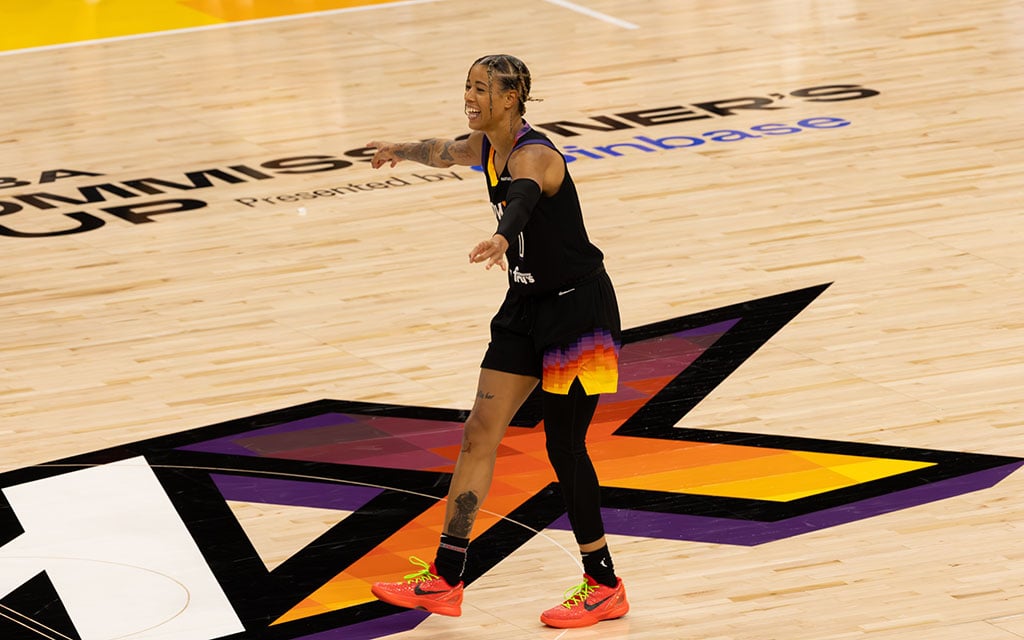
Former Phoenix Mercury guard Sug Sutton, known for her energy off the bench, uses her contract as motivation to improve and excel. (File photo by Joey Plishka/Cronkite News)
PHOENIX – On June 27, Liz Dixon sat on a furniture top in the Verizon 5G Performance Center hallway, discussed the difficulties of living on a WNBA minimum contract and knew she was vulnerable on the one-year, $64,154 deal that offered little to no security and stability.
Five days later, the Phoenix Mercury waived the forward.
“One of the hardships is teams can get anybody under minimal contracts,” Dixon said. “You’re already paying me less than everybody else, but what if one day they don’t need you? They’ll want somebody else they can get. They can get another vet at the exact same price as a rookie. So it’s more like, ‘Hey, even though I am making the minimum payment, am I still needed? Am I still an asset to them?”
Phoenix re-signed Dixon on July 7, but she was waived before the end of her seven-day contract and is now a free agent. Mercury forwards Natasha Mack and Mikiah Herbert-Harrigan and former Mercury guard Sug Sutton share a similar experience to Dixon as players on a minimum contract.
“I feel like any player probably always feels that they feel like they’re always under pressure with the minimum salary and the W(NBA),” said Sutton, who was traded to the Washington Mystics in late August.
Sutton also acknowledged thoughts of comparison to other players and fears associated with a lack of security on her current contract. However, most of the St. Louis native’s concerns are external.
“I come from a place (where) some of my family are not doing too well,” she said. “Sometimes, I try to provide for my family. So that can be tough when you’re getting a minimum salary with the WNBA.”
Although the WNBA minimum contract value will increase from $64,154 to $70,103 by 2027, a roughly 23% increase from 2020, it remains minuscule compared to the NBA’s minimum deal. NBA players with two years of experience on a minimum salary earn $2,087,519, which is expected to increase to $2,778,488 in 2027.
The WNBA launched in 1996, 47 years after the NBA experienced its genesis. To some, comparing the league’s contract values isn’t plausible due to the length of existence and the NBA’s accrued revenue; however, to reject the glaring difference doesn’t offer a solution to the problems that players on a minimum deal may endure.
Marcus Johnson, vice president of investment management at Johnson Financial Advisors, said that $64,000 is “average” for most people in Phoenix but added that, although it’s “not living in poverty,” it’s not “living wealthy.”
Mack and her family grew up below the poverty line in Lufkin, Texas. She only sometimes had an extra $20 to go to the movies with her friends or eat spaghetti for the entire week. Her experiences increase her appreciation for her current position. Mack acknowledged that even though she’s “not getting paid a lot,” her childhood taught her how to “make things work.”
“You want things, and you see people getting things; you can’t have those things because you can’t afford them right now,” Mack said. “What you are making in the W(NBA), you have to pay for gas (and) food. Thank God we don’t have to pay for rent. You don’t really have money to boast, so you learn how to be smart with it.”
Herbert-Harrigan is required to exercise extensive consciousness when stewarding her finances. The University of South Carolina product gave birth to a son in October 2021. She said it was “pretty tough” to balance motherhood and commitment to basketball when her child was younger.
“The hardships of it (is that) we put in a lot of work to get, especially to make a WNBA roster. So … the minimum, it’s tough,” Herbert-Harrigan said. “And especially, I’ve been a mom and (have) to go overseas … to make double, triple the amount you made in the W(NBA) so I mean, that’s the tough part about it.”
WNBA players travel during the offseason overseas, where they can make three to four times their base salary. Sutton, Dixon, Harrigan and Mack have also played overseas in their careers to secure increased income.
Johnson called it a “business decision” on the WNBA to improve their salary cap. Mercury guard Natasha Cloud highlighted the league’s many improvements from the collective bargaining agreement in 2020. Still, she put the onus on the league to pay attention to players on a minimum contract in the newly reported $200 million CBA deal set to begin 2026.
“Honestly, when you talk about a minimum salary, it’s not players that I want to talk to. It’s the league that I want to talk to,” Cloud said. “Because (in) our last CBA, while it was so great in a bunch of areas, it forgot the biggest piece of what this league is. This league is not the 1% of what you see on TV and broadcasted … the top five or seven players of our league. This makeup is the majority of the middleman people, that minimum contract (player).”
Cloud, a former second-round draft pick, was once a minimum-salary player. The nine-year veteran believes the key to overcoming that hurdle is for the athlete to find their role and master it.

Natasha Cloud, a veteran guard who signed a two-year, $400,000 deal with the Phoenix Mercury, emphasizes mastering one's role in the WNBA. (Photo by Shirell Washington/Cronkite News)
“When you talk about our salary caps, the middlemen are the ones that get screwed because you cannot afford a vet minimum, you cannot afford a medium salary. So to them, it’s just continuing to work,” Cloud said. “(For) players that come in this league, I made a career just finding my role and doing it well.”
Cloud trusted her ability to execute as a defensive-minded point guard. Mastering her role earned her a two-year, $400,000 contract in February with Phoenix.
“That’s what is going to get you paid when you have your role, and you know what your role is,” she said. “That role is an important piece to the team’s success.”
Sutton understands her team leans on her as a spark plug off the bench. The second-year guard knows her contract doesn’t reflect her value as a player but uses it as motivation.
“Being on the salary cap, it motivates me just to get better and to be where I want to be,” Sutton said. “I’m always hard on myself, but it continues to motivate me, continues to allow me to have room to grow and continue to be the best that I can be.”
Dixon used her contract as a catalyst for vulnerability and to ask difficult questions.
“This makes us lean into our support system and have tough conversations, like, ‘Hey, how do you feel about me and what I need to work on?'” Dixon said.
When her current deal produces anxiety, Dixon’s family keeps her grounded.
“They always remind me, ’Hey, just stay where your feet are and just enjoy the moment because you never know how long it’s going to last,'” Dixon said. “So as long as you just keep enjoying the moment and keep controlling everything you can control, everything is going to work out in the end.”
While Mack reflects on her childhood struggles to remain grateful for the present opportunity, her faith keeps her focused when her contract fosters worry.
“You got to have faith. My family has raised me around God, and he’s going to make a way,” Mack said. “Times are going to be hard, but it could be worse; people have been worse. So you just have to look forward to each day. You can’t look forward to the future. You have to take each day, day by day because tomorrow is not promised to anybody. So that’s how I handle life.”
Mack recognizes that everyone’s path is different, and her purpose remains the same regardless of the salary.
“You’re your own person,” Mack said. “They (higher salaried players) might have proven themselves years ago, and I’m just now getting eyes on me, so I can’t compare myself to them. You can’t compare your hardware to theirs because everybody has a different path (and) different story. I just have to make an impact wherever I go.”
Cloud wants players on a minimum deal to know their colleagues cherish their presence in the league and recognize their perpetual impact.
“I just want them to still feel seen and heard and know that they are loved and appreciated because they make up (the) majority of what this league is,” Cloud said. “They haven’t had the light kind of shine on them the way it should.”

